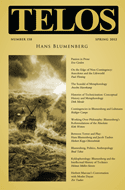Telos 158 (Spring 2012) is now available for purchase in our store.
 This special issue of Telos focusing on the work of the German philosopher Hans Blumenberg aims to reinvigorate the critical engagement with his work in the English-speaking world by casting a new light on his thought and its fundamental concerns. The American reception of Blumenberg reached an initial high point in the late 1980s and 1990s with Robert M. Wallace’s remarkable translation of three monumental volumes: The Legitimacy of the Modern Age (1983), Work on Myth (1985), and The Genesis of the Copernican World (1987). This reception often (though not exclusively) focused on the questions prompted by Blumenberg’s contributions to the secularization debates surrounding thinkers such as Karl Löwith, Carl Schmitt, and Ernst Kantorowicz. In what can be read as a response to Schmitt’s famous claim that “all significant concepts of the modern theory of the state are secularized theological concepts,” Blumenberg introduces the notion of reoccupation (Umbesetzung). With it he argues against the continuity of theology as the “answer” to the question of the political in favor of the persistence of questions, including that of the political, that are constantly re-answered in original ways. Hence, the modern state for Blumenberg is not based on secularized theological concepts but on new answers to ongoing questions; modernity thus possesses at least the relative “legitimacy” characteristic of systems and institutions in general. For Blumenberg, the latter are never completely originary or purely (i.e., legitimately) derived but are always the result of the complex system of exigencies that produce each “reoccupation.” The specific quality of the modern age, which differentiates it from all others, is “self-assertion” (Selbstbehauptung), a paradoxical form of self-legitimation according to which historical transfers and traditions are the basis for unprecedented new formations. Such questions of secularization, together with their important implications for a theory of modernity and the conceptualization of history, have been discussed and debated by prominent thinkers like Robert Pippen, Richard Rorty, Martin Jay, and Elizabeth Brient.
This special issue of Telos focusing on the work of the German philosopher Hans Blumenberg aims to reinvigorate the critical engagement with his work in the English-speaking world by casting a new light on his thought and its fundamental concerns. The American reception of Blumenberg reached an initial high point in the late 1980s and 1990s with Robert M. Wallace’s remarkable translation of three monumental volumes: The Legitimacy of the Modern Age (1983), Work on Myth (1985), and The Genesis of the Copernican World (1987). This reception often (though not exclusively) focused on the questions prompted by Blumenberg’s contributions to the secularization debates surrounding thinkers such as Karl Löwith, Carl Schmitt, and Ernst Kantorowicz. In what can be read as a response to Schmitt’s famous claim that “all significant concepts of the modern theory of the state are secularized theological concepts,” Blumenberg introduces the notion of reoccupation (Umbesetzung). With it he argues against the continuity of theology as the “answer” to the question of the political in favor of the persistence of questions, including that of the political, that are constantly re-answered in original ways. Hence, the modern state for Blumenberg is not based on secularized theological concepts but on new answers to ongoing questions; modernity thus possesses at least the relative “legitimacy” characteristic of systems and institutions in general. For Blumenberg, the latter are never completely originary or purely (i.e., legitimately) derived but are always the result of the complex system of exigencies that produce each “reoccupation.” The specific quality of the modern age, which differentiates it from all others, is “self-assertion” (Selbstbehauptung), a paradoxical form of self-legitimation according to which historical transfers and traditions are the basis for unprecedented new formations. Such questions of secularization, together with their important implications for a theory of modernity and the conceptualization of history, have been discussed and debated by prominent thinkers like Robert Pippen, Richard Rorty, Martin Jay, and Elizabeth Brient.


